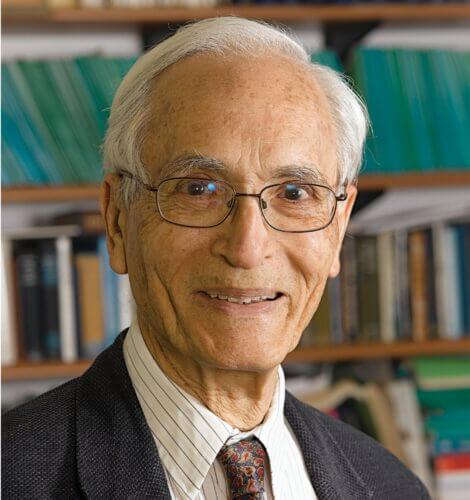Research Prof. Ziv from the Faculty of Electrical Engineering at the Technion is the first Israeli to win the Medal of Honor - the most prestigious award given by the union and one of the most prestigious in the world of technology

Research Prof. Yaakov Ziv from the Viterbi Faculty of Electrical Engineering at the Technion won the IEEE Medal of Honor - the medal of honor of the International Union of Electrical and Electronics Engineers. Research Prof. Ziv, one of the most important personalities in the world of information and the inventor of the Lampel-Ziv algorithm and the Weiner-Ziv algorithm, will receive the medal for his extensive contribution to information theory and data compression and for his exceptional research leadership Thus he will be the first Israeli to win this world recognition.
IEEE President, Prof. Toshio Fukuda, announced the win to Research Prof. Ziv.
IEEE is the largest academic-engineering association in the world and has about half a million companies and members from 150 countries. The Association's Medal of Honor has been awarded since 1917 to a single winner each year for outstanding engineering-academic or career contributions. This is the most prestigious award given by the IEEE association and the most prestigious in the world of technology, and it honors individuals whose extraordinary achievements have left a mark for years on technology, society and engineering. The winners of the medal over the years are personalities who shaped the history of the worlds of information, communication and computing, and these are some of them: Claude Shannon, the father of information theory; Giuliello Marconi, inventor of the wireless; Gordon Moore, who formulated Moore's Law; Andy Grove, who was CEO and Chairman of Intel; Harry Nyquist, one of the prominent figures in information theory; and the founders of Qualcomm Erwin Jacobs and Prof. Andrew Viterbi (who made a significant contribution to the Faculty of Electrical Engineering at the Technion and since then it has been named after him and his late wife Erna).
According to Dean of the Viterbi Faculty of Electrical Engineering Prof. Nahum Shimkin, "Research Prof. Ziv does not deserve this honorable recognition. This is a great pride for the faculty and the Technion."
"This is a great honor for Research Prof. Ziv and the Technion," he said Prof. Uri Sion, president of the Technion. "His ground-breaking scientific and practical contributions are a source of inspiration for the best engineers in the world. His research at the Faculty of Electrical Engineering brought about a significant revolution and laid the foundations for the Israeli startup nation. "
Prof. Ziv Research, born in 1931, completed a bachelor's and master's degree at the Faculty of Electrical Engineering at the Technion, followed by a doctorate at MIT (in 1962). After about eight years of research and development at Rafael and Bell Laboratories in the United States, he joined the Technion faculty. Over the years, he held senior positions, including the vice president of the Technion for academic affairs, chairman of the Israel Academy of Sciences, and president of the Israel Academy of Sciences. He is a member of the National Academy of the United States and the American Academy of Arts and Sciences.
Research Prof. Ziv has won many prestigious awards, including the Israel Security Award (twice), the Israel Award for Exact Sciences (1993), the Marconi Award (1995), the Richard Hemming Medal (1995), the Shannon Award (1997), the Knowledge Front Award of BBVA Foundation (2009) and the A.M.T. (2017).
In 1977, Research Prof. Ziv and Prof. Avraham Lampel from the Faculty of Computer Science published the initial version of Lempel-Ziu algorithm, and in 1978 the second version. Both versions served as a basis for essential compression technologies including TIFF, PNG, ZIP and GIF and played a central role in the PDF (for documents) and MP3 (for music) formats. This is an algorithm for compressing information that allows compression without loss of information, (lossless compression) independent of the data structure and without prior knowledge of the statistical properties of the data. Many of the compression technologies used today in memory devices, computers and smart phones were developed on the basis of this algorithm.
Lempel-Ziu algorithm contributed to the world, free of charge, an unprecedented technology that allows the transmission of visual and other information at high speed without data loss. In 2004, the International Association of Electrical and Electronics Engineers (IEEE) declared that the Lampell-Ziu algorithm is "a milestone in electronics and computer engineering" and that it "made a significant contribution to the transformation of the Internet into an effective means of global communication."
Research Prof. Ziv also participated in the development of the Weiner-Ziv algorithm at Bell Laboratories. This algorithm, which is now part of Microsoft's operating system, enables the compression of many images from different cameras, for example in football matches, and their transmission at the same time.
More of the topic in Hayadan:
- Prof. Yaakov Ziv from the Technion won the AMT award for his contribution in the fields of information and communication
- The biggest award in the world after Nobel - to Professor Yaakov Ziv from the Technion
- The algorithm of professors Ziv and Lempel from the Technion was recognized as a "milestone" in the development of electronics

2 תגובות
June - added Yaakov Ziv to the list of geniuses on the site!
respect! But it looks like the entry needs some help adding information
https://geniuses.club/genius/yaakov-ziv
respect!
Sounds like a genius... why doesn't anyone add him to the genius site?
http://www.geniuses.club
I suggest to those who know/appreciate the professor to write an entry for him